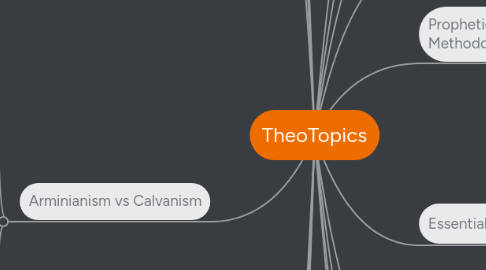
1. Eschatological Interpretations
1.1. Preterist
1.1.1. Preterism is a Christian eschatological view that interprets prophecies of the Bible as events which have already happened. Daniel is interpreted as events that happened in the second century BC while Revelation is interpreted as events that happened in the first century AD. Preterism holds that Ancient Israel finds its continuation or fulfillment in the Christian church at the destruction of Jerusalem in AD 70. The term preterism comes from the Latin praeter, which is listed in Webster's 1913 dictionary as a prefix denoting that something is "past" or "beyond," signifying that either all or a majority of Bible prophecy was fulfilled by AD 70. Adherents of preterism are commonly known as preterists.
1.2. Historicist
1.2.1. Historicism is a method of interpretation in Christian eschatology which associates biblical prophecies with actual historical events and identify symbolic beings with historical persons or societies.
1.3. Futurist
1.3.1. Futurism is a Christian eschatological view that interprets the Book of Revelation, the Book of Daniel, the Olivet discourse and the parable of the Sheep and the Goats as future events in a literal, physical, apocalyptic, and global context.[1] By comparison, other Christian eschatological views interpret these passages as past events in a literal, physical, and local context (Preterism and Historicism), or as present-day events in a non-literal and spiritual context (Idealism).
1.4. Idealist
1.4.1. Idealism (also called the spiritual approach, the allegorical approach, the nonliteral approach, and many other names) in Christian eschatology is an interpretation of the Book of Revelation that sees all of the imagery of the book as non-literal symbols.[1]
2. Rapture
2.1. Pre-Trib
2.2. Mid-Trib
2.3. Post-Trib
2.4. Pre-Wrath
2.5. Partial
3. The Millennium
3.1. A=Mill
3.2. Pre=Mill
3.3. Post-Mill
4. Trinity?
4.1. Oneness
4.2. Trinity
4.2.1. Seperate Entities
4.2.2. 1 Entity, 3 beings
5. Comma Johanneum
6. Inerrency/Infalability of the Bble
6.1. KJV Only Debate
6.2. Translation Issues
7. Arminianism vs Calvanism
7.1. Arminianism
7.1.1. Brief History
7.1.2. 5 Points
7.1.2.1. 1.
7.1.2.1.1. Human Free Will - This states that though man is fallen, he is not incapacitated by the sinful nature and can freely choose God. His will is not restricted and enslaved by his sinful nature.
7.1.2.2. 2
7.1.2.2.1. Conditional Election - God chose people for salvation based on his foreknowledge where God looks into the future to see who would respond to the gospel message.
7.1.2.3. 3
7.1.2.3.1. Universal Atonement - The position that Jesus bore the sin of everyone who ever lived.
7.1.2.4. 4
7.1.2.4.1. Resistable Grace - The teaching that the grace of God can be resisted and finally beaten so as to reject salvation in Christ.
7.1.2.5. 5
7.1.2.5.1. Fall from Grace - The Teaching that a person can fall from grace and lose his salvation.
7.2. Calvanism
7.2.1. Brief History
7.2.2. 5 Points
7.2.2.1. 1
7.2.2.1.1. Total depravity: that man is touched by sin in all parts of his being: body, soul, mind, and emotions
7.2.2.2. 2
7.2.2.2.1. Unconditional Election: that God’s favor to Man is completely by God’s free choice and has nothing to do with Man. It is completely undeserved by Man and is not based on anything God sees in man
7.2.2.3. 3
7.2.2.3.1. Limited atonement: that Christ did not bear the sins of every individual who ever lived, but instead only bore the sins of those who were elected into salvation
7.2.2.4. 4
7.2.2.4.1. Irresistible grace: that God's call to someone for salvation cannot be resisted
7.2.2.5. 5
7.2.2.5.1. Perseverance of the saints: that it is not possible to lose one's salvation
8. Faith vs Works
9. The Gap Theory
9.1. Link 1
9.2. Cycles
9.3. Pre-Adamic Race
10. Angels
11. 7yr or 3.5yr Trib
12. Evil
13. Eternal Damnation
14. Prophetic Interpretaion Methodology
14.1. Literal
14.2. Metaphoirical
14.3. Allegorical
15. Dispensationalism
16. Essential Christianity
16.1. Basics
16.1.1. Mothothieism
16.1.2. Diety of Christ
16.1.3. The resurrection
16.1.4. The Gsopel
16.1.5. Salvation by Grace
